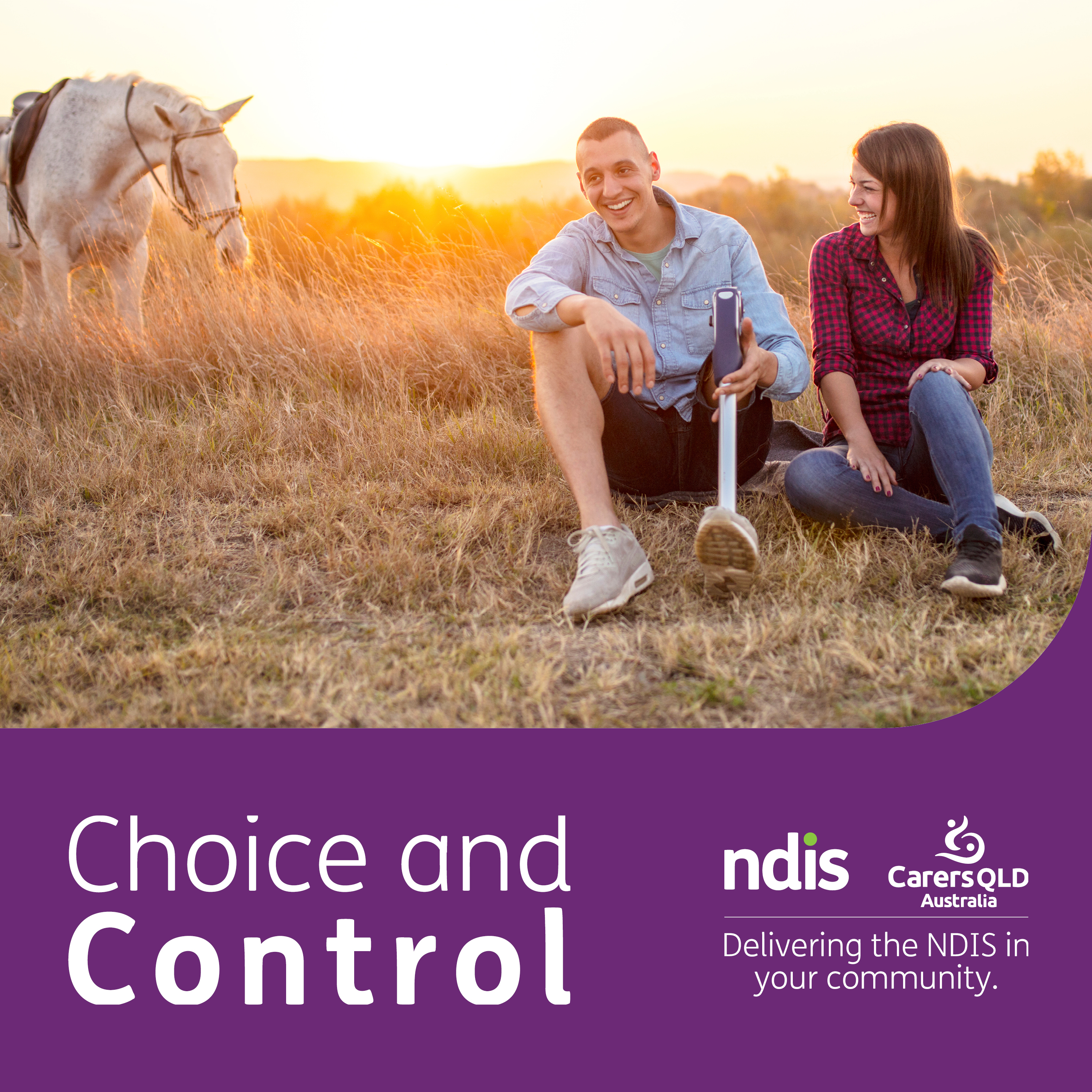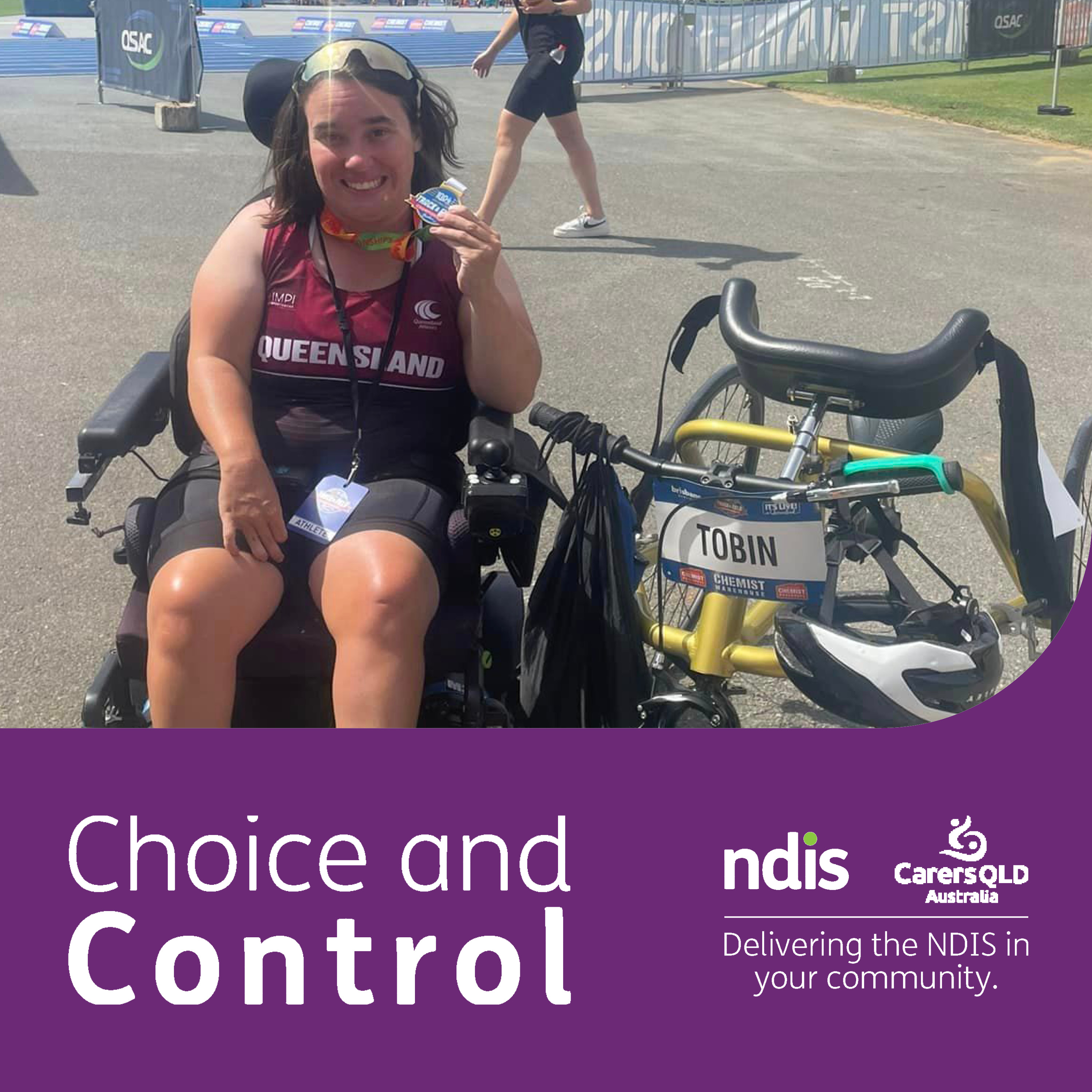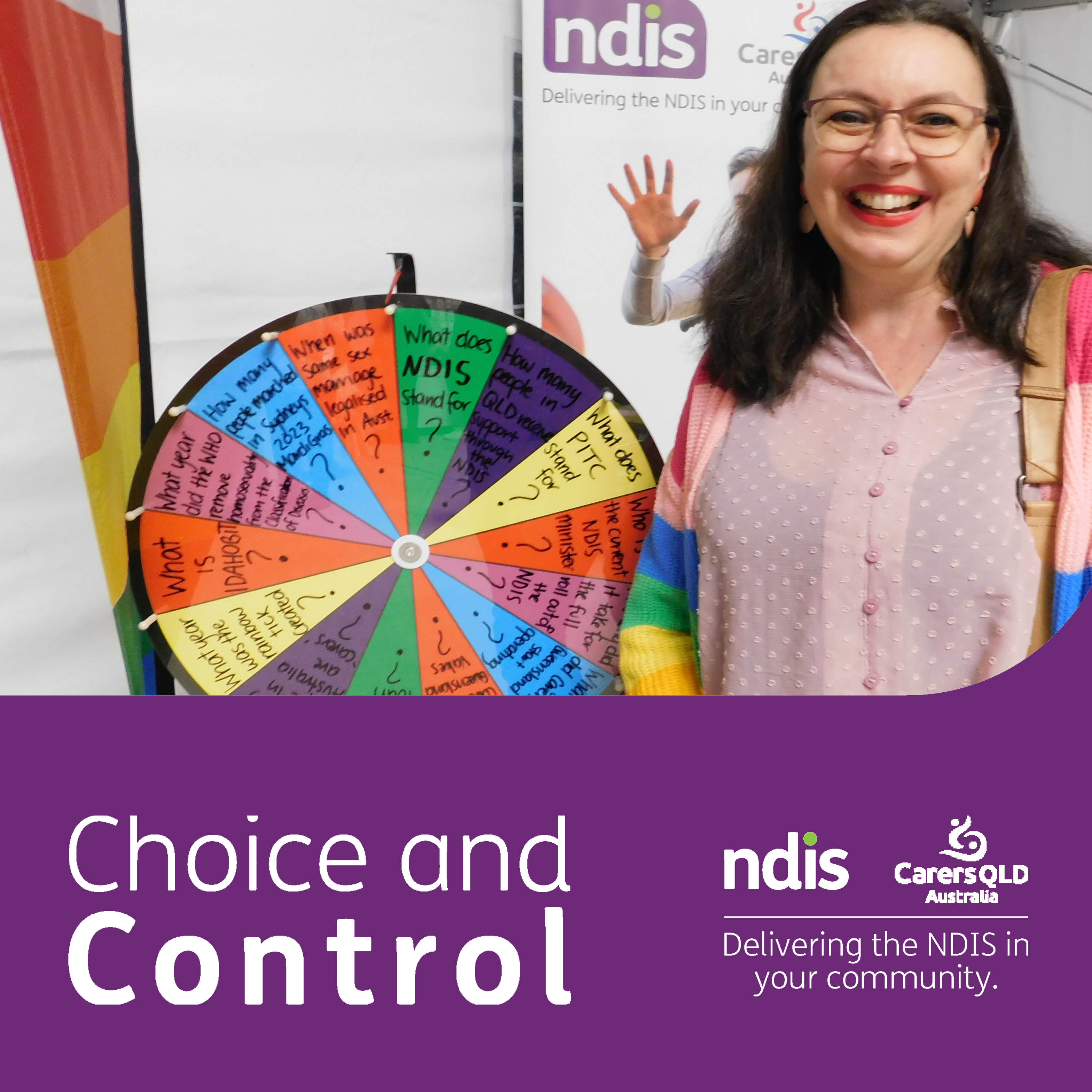Speaker 0 00:00:00 AAC connect. It's a new way to stay in touch with your local area coordinator, carers Queensland, with everything you need right here on your device. It's a handy app to keep track of your C appointments, browse workshops, and events, check out information and support and get the latest news stories and podcasts it's available on Android and iOS. So whatever device you have, you can stay in touch, head to our website, to sign up at carers QLD com AU. And look for connect
Speaker 0 00:00:39 Joyce and control a podcast, celebrating people with disability brought to you by carers Queensland, N D I S local area coordination partner in the community. The late teenage years are an incredible time of change and adventure. It's the end of school, maybe going to uni or TAFE or into an apprenticeship, moving out, getting your first grown up job, getting your license, getting a car, building your independence for young people who need a bit more support or a bit more time to reach those milestones. It can be a very uncertain time and a very stressful one for their families, parents, and carers. That's where carers Queensland's school to adult life transition project comes in. The project works with families of 12 to 18 year olds to make sure they start their adult lives with the same opportunities as their peers, without disability. Jasmine for at Clark is from Kara Queensland's local area coordination partner in the community program community and mainstream team.
Speaker 2 00:01:37 The school to adult life transition project is aiming to identify existing barriers and develop and facilitate activities that will work towards greater outcomes for young people with disability as they transition from school into adult life. Um, so these activities, um, are working towards increased inclusion of young people in fundamental skill development and enabling them to transition out of school as successfully as their peers, without disability, with greater social and economic opportunities.
Speaker 3 00:02:13 In what space are we doing that I hear that we've had some school to outta life transition forums. How's that been going?
Speaker 2 00:02:19 Yeah, so we ran, um, our first family connect forum in sh site earlier this year, we called it the school to adult life transition family connect forum, and we invited parents and carers of young people age 12 to 18 years, um, to come together and sort of be experts in their own lives. They shared experiences some of their plans, um, some of their concerns, um, some of their ideas with their peers, um, and start to think about how they can make that transition to adult life successful for their young person. So we, um, grouped parents and carers to discuss a range of topics using the broad headings of work, uh, lifelong learning relationships, social and community participation, health and wellbeing choice and control and independent living skills. So, um, you might recognize those, um, from the N D I S life domains. So we are trying to use that language cuz it's familiar to people and those conversations were really exploring, um, the parents' ideas, um, some strategies, some barriers that exist regarding successful transitions.
Speaker 3 00:03:34 And what sort of feedback have you got from parents and carers from the forum,
Speaker 2 00:03:38 Parents and carers reported increased confidence levels. So feeling more confident in supporting their children with this transition from school to adult life.
Speaker 3 00:03:48 And why do you think it's important for carers Queensland to actually be able to do things like this forum for, for families and carers, to understand a little bit more about their child as they become adults and, and leave school? Why is it important?
Speaker 2 00:04:02 I think it's a really, um, difficult time for all families, um, to go from something that's been so familiar for a really long time. And then it's hard for all of us to know what to do when we finish school. Um, and we know parents have reported to ask that it's really hard to know what all of the available supports are in their local area. So by bringing peers together, they're able to bring their knowledge and their understanding of existing resources and, and supports and kind of refer each other into different programs. And, and it's able to sort of bring everyone together and talk about the importance of working with all the supports that might be in a young person's life. So for example, um, family and informal networks, community mainstream, and then our N D I S fund support, sort of all working together alongside that young person so that they can achieve the goals and they can do the things that they would like to do when they finish school.
Speaker 0 00:05:03 Everybody has rights, but sometimes it's not easy to speak up and advocate for yourself. It takes confidence, resilience, knowing your rights and knowing someone has your back, be the voice you want to be can help. It's a free program from carers Queensland, for people with disability, it'll build your skills, help you be a strong advocate for yourself, your family and friends, maybe even your community along the way, you'll build a peer network. So you have a squad to support you speaking up, find out more, get in touch or look for events and opportunities coming up near you. Visit our
[email protected] or call our inquiries line on one, three hundred nine six three six. One of the parents currently living through this is Annette. Her daughter, Jay is 18 she's finished school and has been using the N D I S for about four years now.
Speaker 4 00:06:00 She was diagnosed in primary school with intellectual impairment. And because of that, that was a big struggle for her at school. And thank goodness for the help of N D I S we were able to access a lot of help for Jay that we had, uh, the psychologist, because she was also self-harming at one point when she was frustrated and she didn't know what's going on, why she's like that like different from other kids. And then the OT was very good because Jay has got a bit of a, um, deaf perception in the beginning when she was younger. And also she has, uh, she's time blind. Uh, she's also has dyscalculia, which is very hard for her to understand maths and numbers and also the speech therapist, which is good because before she's only one question on answer kind of girl, at least now she can elaborate a little bit and, um, some support group or support person. So Jay is really, um, need all of this, um, help from the N D I S
Speaker 3 00:07:07 Oh, that's great. Sounds like she's going well, compared to when you first started with the N D I S that's great.
Speaker 4 00:07:13 Yeah, it did really, really help her. Although we still have a lot of challenges, you know, one of the strategies that she was taught and we also taught as well, and the OT used to set alarms. So we're getting there if you know what I mean? Yeah. So, yeah, so that's just like part of the challenges she has.
Speaker 3 00:07:31 Mm. And that, and that's why you access an OT to be able to help her with that. Yeah. And you said, and you touched on, she has support workers as well.
Speaker 4 00:07:39 Yeah. She has support worker for the life skills, although we also teach her at home, but this, um, support person is going to help Jay towards her own have a little business that her own business, uh, working dogs. And so she can be a part of the community and earn some money herself as well. So that's, what's just helping Jay with.
Speaker 3 00:08:00 And how long is that away from being established?
Speaker 4 00:08:03 Well, she was supposed to launch on when she turned 18 last April, but because of COVID and her getting the first eight was, uh, with the dogs and the trainer, it took a while because of, you know, the COVID so hopefully by end of the year.
Speaker 3 00:08:20 Oh, that sounds fantastic. And that's a really good segue into, um, into my next question. You obviously went to the carers Queensland school to adult life forum recently. Why did you decide to attend the forum and what did you hope to get out of attending?
Speaker 4 00:08:38 Oh yeah. Well, we went there because we were hoping to get some information on how we can help Jay, you know, become part of the community and her independence. And also by going there, it was a good, um, idea of getting information from other parents as well, who has kids like our, you know, daughter and sort of like, uh, get a bit of, uh, connection and information and, and what other parents do, where do other parents go to get help?
Speaker 3 00:09:10 And what information did you take away from attending?
Speaker 4 00:09:14 Oh, a lot of, uh, ideas and information from other parents. Like, for example, if you, a child has got a bit of a talent, like for example, sports, there's a lot of sport organization that helped them. And also, because for example, Jay, I found out that she wanted to learn how to drive so she can become independent. I didn't realize there's also a special, you know, driving school that help kids like them, kids with autism and, and stuff like that, you know? Um, yeah. So I was able to get that information and also for them to learn how to cope. I didn't realize it's a lot of N D I S funded company who helped kids, you know, to, to get towards part of independence and learning all those different skills.
Speaker 3 00:10:00 Absolutely. And she's 18, she'd be thinking about that independence, like you said, getting a license and then thinking about cooking for herself. Is that something you see in the near future, her developing an independence and maybe even moving out and things like that.
Speaker 4 00:10:15 Yeah. In the future. I'm not, I'm not sure if it's in the near future because she even asks the question not long ago. Do you think I'll be able to live by myself one day? And we always say absolutely, but we just need to, you know, take our time into learning and being confident in doing things that you need to do, especially the basics. So hopefully she will in the future be able to live independently.
Speaker 3 00:10:40 And you said you found out a bit more about how, um, you know, people with autism, they can get their license for through a special, um, driving school also about the cooking. You mentioned, have you looked into that further for her?
Speaker 4 00:10:55 I have actually, yeah. We contacted one person, uh, for driving. Um, because you know, now as you know, school is finished and she's doing anything at the moment, although, uh, there's a company that help her get a job. And she has a job, which is like three hours a day, two to three times a week. And that's end up for her to be able to get out by saying, you know, uh, tables in a restaurant mm-hmm <affirmative>. And, um, also, uh, the driving school she's a little bit bored. And I thought if she gets a, a license, she will be able to start volunteering in the animal shelters. And this driving school actually is going to refer us, uh, an OT to assess Jay on what she needs. Therefore they can refer her to a driver school that will suit her needs. So I spoke to a lady today and she's going to give it all the information.
Speaker 3 00:11:50 That sounds fantastic. Why do you think it's important for families who have a child with a disability be able to access, access this type of information to help them in the future?
Speaker 4 00:12:01 Oh yeah. A lot of families got no idea where to go. And I think the forum room is a very good, uh, I wouldn't say exposure, but it's a very good information session for us to get some, you know, help or information or referral or other things that other family do. So for us to be able to, yeah, get ideas, I guess, where to ask help and finding out their own experiences. Oh, you know, it gives you idea on what to do yourselves. Cause a lot of parents don't know like this person who was sitting with, he's got no idea how to get her child into a, um, work experience. And I think her, his daughter is 18 years old and they have no idea. So that session, I think, gave him a lot of information.
Speaker 3 00:12:53 It sounds like it was really worth it. Yeah.
Speaker 4 00:12:55 It was, it was definitely worth it.
Speaker 3 00:12:57 Oh, that's great. And so you touched on, obviously Jay's, um, getting a bit of OT, has support workers. Is there any other N D I S supports that she's accessing now?
Speaker 4 00:13:08 Yeah. Um, psychology. Yeah. She sees a psychologist, a support person, um, OT. And we just finished the speech because Jay feels that, uh, OT is more important. So we added that time towards her OT instead of speech and, uh, support person for, you know, uh, life skills and hopefully this driving and the cooking, um, classes will be the next step that we go looking into. And hopefully it will be a good, you know, help for Jay.
Speaker 3 00:13:40 And you touched on that, you know, she does want that independence, just like any other 18 year old. Does, does she have any other goals or passions?
Speaker 4 00:13:47 Oh yeah. She wanted to become an animal therapist eventually, but to get into that, she would probably she's happy looking into volunteering into, you know, animal shelters, mm-hmm <affirmative> guide dogs, or maybe the RSPCA. She wanted to become a animal rescuer mm-hmm <affirmative> so that's the kind of thing I think that would Jay and her walk dog walking business to give her financial support in the future. Yeah.
Speaker 0 00:14:16 School to adult life transition is part of driving inclusive change. It's a carers Queensland initiative that has projects working all across the community to improve outcomes, accessibility, and inclusion for people of all abilities. We're working with councils and businesses, the multicultural community, first nations families, everything from disaster planning to community gardens. You can find out more on our websites, carers qld.com.au. And look for driving inclusive change, or you can give our inquiries line a call on 1300 triple nine, six three six. Thanks for joining us at choice and control a carers Queensland podcast. For more information about the national disability insurance scheme or carers Queensland, contact us
[email protected]. You can call us on one, three hundred nine, six, three, six, or head to Facebook and look for carers Queensland. N D I.


